The WORST episodes of PBS Specials
Every episode of PBS Specials ever, ranked from worst to best by thousands of votes from fans of the show. The worst episodes of PBS Specials!
The Public Broadcasting Service (PBS) is an American non-profit public broadcasting television service with 354 member TV stations in the United States which hold collective ownership. However, its operations are largely funded by the Corporation for Public Broadcasting. Its headquarters are in Arlington, Virginia. PBS is the most prominent provider of programming to U.S. public television stations, distributing series such as PBS NewsHour, Masterpiece, and Frontline. Since the mid-2000s, Roper polls commissioned by PBS have consistently placed the service as America's most trusted national institution. However, PBS is not responsible for all programming carried on public TV stations; in fact, stations usually receive a large portion of their content (including most pledge drive specials) from third-party sources, such as American Public Television, NETA, and independent producers.
#1 - The Real Adam Smith: Ideas That Changed the World (2)
Season 2016 - Episode 10 - Aired 3/26/2016
Ideas That Changed the World explores contemporary life and Smith’s influences on the very things we see going on today. Why is Smith widely studied now in China? Ethical businesses, like Whole Foods, showcase the morality Smith insisted was critical to thriving markets. Uber and eBay demonstrate that markets can thrive through the organization and “self-policing” of the participants themselves.
#2 - Absolutely Irish
Season 2008 - Episode 15 - Aired 3/4/2008
Filmed live at the Irish Arts Center in New York City's famous Hell's Kitchen neighborhood, Absolutely Irish brings together three generations of the brightest stars of traditional Irish folk music for a one-in-a-lifetime performance. With performances by Mick Moloney; whistle player Joanie Madden; fiddlers Liz Carroll, Eileen Ivers, and Athena Tergis; flute and banjo player Seamus Egan; guitarist John Doyle; singers Karan Casey, Robbie O'Connell, and Susan McKeown; piper Jerry O'Sullivan; concertina player Tim Collins; accordionist Billy McComiskey; dancers Niall O'Leary and Darrah Carr; and special appearances by legendary flute player Mike Rafferty and 85-year-old Irish dancer Jo McNamara, it's sure to blow folk music fans away.
#3 - Celtic Woman: Songs from the Heart
Season 2009 - Episode 25 - Aired 12/7/2009
Celtic Woman vocalists Lisa Kelly, Chloe Agnew, Lynn Hilary and Alex Sharpe, with violinist Mairead Nesbitt, perform at Ireland's historic Powerscourt House and Gardens in Enniskerry, County Wicklow in their PBS special CELTIC WOMAN: SONGS FROM THE HEART. The musical repertoire ranges from spirited Celtic fiddle and bodhran pieces to lush arrangements of Irish classics, contemporary covers and original compositions. In addition to the six-piece band, the Aontas Choir, a film orchestra, the Discovery Gospel Choir, the Extreme Rhythm Drummers and a bagpipe ensemble join Celtic Woman for this event.
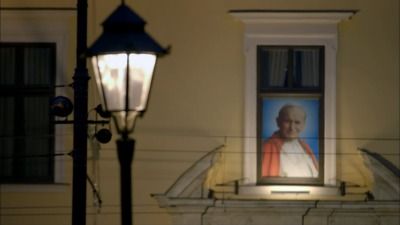
#4 - The Secrets of Saint John Paul
Season 2016 - Episode 15 - Aired 5/10/2016
Pope John Paul II, born Karol Józef Wojtyla, was ordained in 1946, and in 1978, became the first Polish pope and first non-Italian Pope in more than 400 years. He served as head of the Catholic Church until his passing in 2005. Beatified by Pope Benedict XVI in 2011, he was canonized by Pope Francis in 2014. That same year, BBC broadcaster Edward Stourton was ushered into a room in one of Europe’s most celebrated libraries. Watched over by its director, he was shown a pile of papers so sensitive that only a handful of staff knew of their existence. He was looking at a collection of hundreds of personal letters between one of the 20th century’s great public figures—Pope John Paull II—and a Polish American woman, Anna-Theresa Tymieniecka. The letters reveal a deeply intimate friendship that lasted for decades and show the private side of a man who was known and beloved around the world.
#5 - Hitler On Trial
Season 2011 - Episode 7 - Aired 6/3/2011
In the summer of 1931, a young lawyer called Hans Litten put rising political star, Adolf Hitler, in the witness box of a Berlin court. He wanted to expose Hitler's hypocrisy and secret commitment to violence and shatter the Nazi party's political respectability. In an audacious and hostile cross-examination, Hitler was forced to defend his beliefs, his ambitions, his methods and the essence of Nazism, in open court. Litten wanted to challenge the public as Germany and the rest of Europe seemed to be sleep-walking to fascism. If Litten's warnings had been taken seriously, Hitler's financial support might well have collapsed. There would have been no Nazi election victory. No Reichstag fire, no Third Reich, no Final Solution. Litten didn't win, but Hitler never forgot and once the Nazis were in power, Litten was arrested and imprisoned in Dachau concentration camp where he ultimately committed suicide. A brave and complex individual, Litten was left-wing, Jewish, and passionately committed to the idea of justice. This documentary explores Litten's personal story while also examining the broader historical and ethical debate. It discovers the consequences of Litten's heroism both for himself and for those closest to him, tracking his tragic journey from court room to suicide.
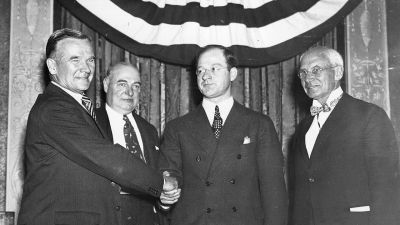
#6 - The Nazi Games: Berlin 1936
Season 2016 - Episode 21 - Aired 8/2/2016
How the Nazis and International Olympic Committee turned the 1936 Olympics, which historically had been a relatively minor event, into a global spectacle.
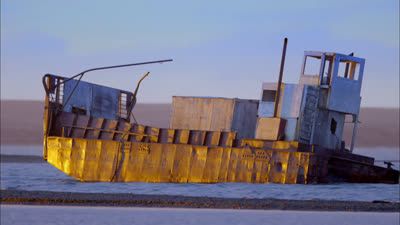
#7 - The Great Polar Bear Feast
Season 2016 - Episode 18 - Aired 6/23/2016
The Great Polar Bear Feast is the astonishing story of an annual natural phenomenon that occurs in early September on the north slope of the Arctic. Every year, up to 80 polar bears gather on the frozen shores of Barter Island, near the village of Kaktovik, to feast on the hunter-harvested bowhead whale remains. This extraordinary gathering is highly unusual because polar bears are known as solitary predators, rarely if ever moving in a group. Kaktovik is a small Inupiat hunting community. Perched on the edge of the world, it’s inaccessible by road and locked in by frozen sea ice for 9 months of the year. But for the month of September, it becomes the center of polar bear studies as scientists and wildlife photographers flock to the tiny town to observe the bears’ unusual behaviour. And with more and more polar bears turning up year on year, scientists are determined to find out why this is happening. How do the bears know to come to this remote island and at exactly this time of year? And what is happening to the polar bears of the South Beaufort Sea that is seeing so many of them desert the ice for land? We also witness what happens to the inhabitants of Kaktovik when the whale bones are picked bare, and the huge group of polar bears heads for the town. The film has extraordinary access to the work of scientist Todd Atwood, the lead polar bear scientist for the U.S. Geological Survey. He has estimated that there has been a 40 percent decline in the polar bears around the South Beaufort Sea since 2006. It is an extraordinary decline, and he is determined to find out why.
#8 - The Work of Art: Artown
Season 2014 - Episode 41 - Aired 5/15/2014
The Work of Art: Artown takes us behind the scenes of Reno’s annual art festival, examining its history and impact. The film highlights diverse groups making a difference within our community: a church helping businesses revitalize a neighborhood, a program utilizing art to improve the quality of life for seniors suffering dementia, Burning Man adding cultural and artistic diversity, and more.
#9 - Tahoe: A Visual History
Season 2015 - Episode 24 - Aired 9/17/2015
A documentary based on the exhibition of the visual history of Lake Tahoe and Donner region on display at the Nevada Museum of Art. The film follows the NMA’s journey to visually survey one of the most beloved landscapes like never before -- through the eyes of 175 painters, photographers, architects, basket weavers, and sculptors.
#10 - Modernist Maverick
Season 2013 - Episode 30 - Aired 9/1/2013
American architect William L. Pereira designed structures and places around the world ranging from San Francisco's iconic Transamerica Pyramid to the Los Angeles County Museum of Art: the University of California, San Diego Geisel Library to the master plan for California's Irvine Ranch and the Los Angeles International Airport. Modernist Maverick surveys Pereira's career.
#11 - Nitty Gritty Dirt Band and Friends- 50 Years and Circlin' Back
Season 2016 - Episode 6 - Aired 3/5/2016
#12 - Lost at Sea: The Search for Longitude
Season 1998 - Episode 4 - Aired 10/6/1998
Based on the bestselling book Longitude by Dava Sobel, the program tells the story of how an unknown genius, John Harrison, discovered the key to navigating on the open seas and thus solved one of the thorniest problems of the 1700s.

#13 - Seized: Inside the Mystery of Epilepsy
Season 2016 - Episode 14 - Aired 5/2/2016
#14 - Temples of Justice
Season 2015 - Episode 3 - Aired 2/26/2015
Temples of Justice visits 45 courthouses in South Dakota and tells the colorful stories of several. You'll find out how swindlers changed history, where there's a bullet hole in a judge's chamber, what cowboys did with their hats and which courthouses helped South Dakotans survive the Great Depression. The production is supported by a grant from the South Dakota Humanities Council.
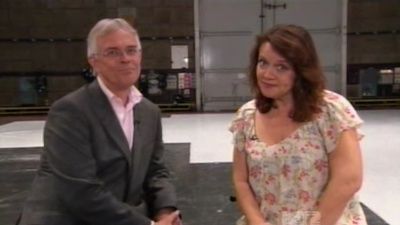
#15 - Behind the Britcoms: From Script to Screen
Season 2011 - Episode 3 - Aired 3/5/2011
Moira Brooker and Philip Bretherton (Judith and Alastair from As Time Goes By (1992)) host this behind-the-scenes look at the work of the writers behind many of our favorite "Britcoms" (British situation comedies), revealing how their ideas make it to the screen.
#16 - Heroes on Deck: World War II on Lake Michigan
Season 2016 - Episode 16 - Aired 5/25/2016
More than 100 WWII aircraft rest on the bottom of Lake Michigan just off the Chicago shoreline. This is the story of how they got there.
#17 - The Real Adam Smith: Morality and Markets (1)
Season 2016 - Episode 9 - Aired 3/26/2016
Morality & Markets explores Smith’s life and role in the Scottish Enlightenment, his thoughts on empathy and how we distinguish right from wrong. French wine, Scottish whiskey, and freshly-baked scones all illustrate Smith’s economic principles. True wealth is defined. We discover Smith’s thoughts on the government’s role in markets, his distaste for monopolies/crony capitalism in the form of the East India Company, and his thoughts on the American colonies.
#18 - The National Parks of Texas
Season 2016 - Episode 13 - Aired 4/26/2016
In time to celebrate the one-hundredth anniversary of the National Park Service, looking at the diverse parks in Texas, and how the stories of the parks tie into the history of the state and the experiences they offer to visitors.
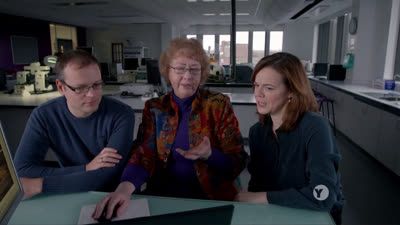
#19 - Shakespeare's Tomb
Season 2016 - Episode 12 - Aired 4/19/2016
Historian Dr. Helen Castor explores the mysteries surrounding Shakespeare’s burial place. Will the first- ever scientific investigation discover why his tombstone's only inscription is a curse against any man who ‘moves my bones’?
#20 - Memory Hackers
Season 2016 - Episode 1 - Aired 2/10/2016
Memory is the glue that binds our mental lives. Without it, we’d be prisoners of the present, unable to use the lessons of the past to change our future. From our first kiss to where we put our keys, memory represents who we are and how we learn and navigate the world. But how does it work? Neuroscientists using cutting-edge techniques are exploring the precise molecular mechanisms of memory. By studying a range of individuals ranging—from an 11-year-old whiz-kid who remembers every detail of his life to a woman who had memories implanted—scientists have uncovered a provocative idea. For much of human history, memory has been seen as a tape recorder that faithfully registers information and replays intact. But now, researchers are discovering that memory is far more malleable, always being written and rewritten, not just by us but by others. We are discovering the precise mechanisms that can explain and even control our memories. The question is—are we ready?
#21 - William Kentridge: Anything Is Possible
Season 2010 - Episode 36 - Aired 10/21/2010
"William Kentridge: Anything Is Possible" gives viewers an intimate look into the mind and creative process of William Kentridge, the South African artist whose acclaimed charcoal drawings, animations, video installations, shadow plays, mechanical puppets, tapestries, sculptures, live performance pieces, and operas have made him one of the most dynamic and exciting contemporary artists working today. With its rich historical references and undertones of political and social commentary, Kentridge's work has earned him inclusion in "Time" magazine's 2009 list of the 100 most influential people in the world. This documentary features exclusive interviews with Kentridge as he works in his studio and discusses his artistic philosophy and techniques. In the film, Kentridge talks about how his personal history as a white South African of Jewish heritage has informed recurring themes in his work—including violent oppression, class struggle, and social and political hierarchies. Additionally, Kentridge discusses his experiments with "machines that tell you what it is to look" and how the very mechanism of vision is a metaphor for "the agency we have, whether we like it or not, to make sense of the world." We see Kentridge in his studio as he creates animations, music, video, and projection pieces for his various projects, including "Breathe" (2008); "I am not me, the horse is not mine" (2008); and the opera "The Nose" (2010), which premiered earlier this year at New York's Metropolitan Opera to rave reviews. With its playful bending of reality and observations on hierarchical systems, the world of "The Nose" provides an ideal vehicle for Kentridge. The absurdism, he explains in the documentary's closing, "...is in fact an accurate and a productive way of understanding the world. Why should we be interested in a clearly impossible story? Because, as Gogol says, in fact the impossible is what happens all the time."
#22 - Dynasty: The Nehru-Gandhi Story: Part 2 - Mother Indira
Season 1998 - Episode 2 - Aired 1/14/1998
#23 - Myths and the Moundbuilders
Season 1981 - Episode 1 - Aired 11/10/1981
Throughout most of the nineteenth century, it was believed that the tens of thousands of earthen mounds that dotted the central United States were engineering feats created by a mysterious, lost race - a race that had been destroyed by the less civilized Indians. By the late 1880s, it was becoming clear that the mounds were actually built by ancestors of the numerous native American groups that still inhabited the central states, such as the Natchez. This film reconstructs the history of ideas associated with the mounds and their builders, from the mid-nineteenth century explorations of curious citizens, to contemporary archaeological research in the Illinois River Valley.
#24 - Ride the Tiger: A Guide Through the Bipolar Brain
Season 2016 - Episode 11 - Aired 3/30/2016
A one-hour documentary that tells the stories of individuals with bipolar disorder.
#25 - Coffee: The Drink that Changed America
Season 2016 - Episode 7 - Aired 3/7/2016
America's love affair with coffee is chronicled. Included: the journey of the drink from Ethiopia to Europe to the Caribbean to modern-day coffee palaces.